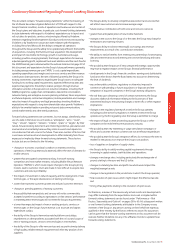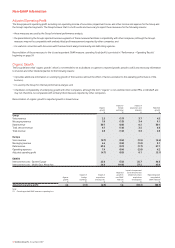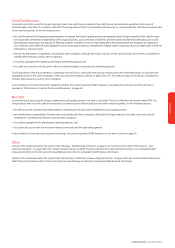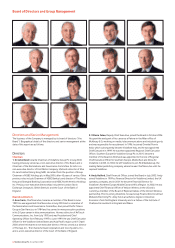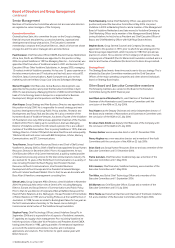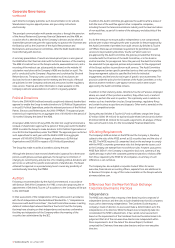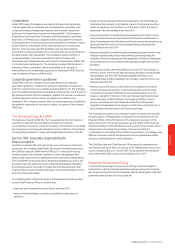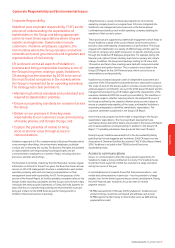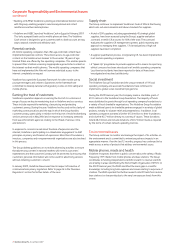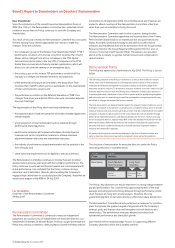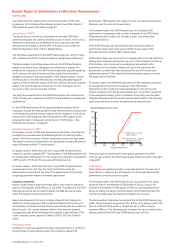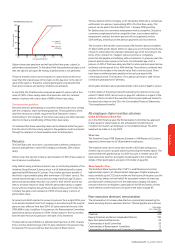Vodafone 2007 Annual Report Download - page 73
Download and view the complete annual report
Please find page 73 of the 2007 Vodafone annual report below. You can navigate through the pages in the report by either clicking on the pages listed below, or by using the keyword search tool below to find specific information within the annual report.
Vodafone Group Plc Annual Report 2007 71
GovernanceGovernance
The Group’s brand essence, which encapsulates the Group’s commitment to
integrity and continuous improvement, in combination with the Group’s
Business Principles, sets the tone of the Group and reflects the control
consciousness of management.
Written policies and procedures have been issued which clearly define the
limits of delegated authority and provide a framework for management to
deal with areas of significant business risk. These policies and procedures are
reviewed and, where necessary, updated at Executive Committee meetings.
Control Environment
The Group’s operating procedures include a comprehensive system for
reporting information to the directors. This system is properly documented
and regularly reviewed.
Budgets are prepared by subsidiary management and subject to review by
both regional management and the directors. Forecasts are revised on a
quarterly basis and compared against budget. When setting budgets and
forecasts, management identifies, evaluates and reports on the potential
significant business risks.
The Executive Committee and the Board review management reports on the
financial results and key operating statistics.
Emphasis is placed on the quality and abilities of the Group’s employees with
continuing education, training and development actively encouraged
through a wide variety of schemes and programmes. The Group has adopted
a set of values to act as a framework for its people to exercise judgement and
make decisions on a consistent basis.
Directors are appointed to associated undertakings and joint ventures and
attend the board meetings and review the key financial information of those
undertakings. Clear guidance is given to those directors on the preparation
that should take place before these board meetings and their activity at the
board meeting. It is the Group’s policy, where possible, that its auditors are
appointed as auditors of associated companies and joint ventures.
The acquisition of any business requires a rigorous analysis of the financial
implications of the acquisition and key performance figures. A sensitivity
analysis takes place of the key assumptions made in the analysis. Post
investment appraisals of the Group’s investments are conducted on a
periodic and timely basis. The Group’s policy is to bring acquired companies
within its governance procedures as soon as is practicable and, in any event,
by the end of the first full year of operation.
The Board reviews a half-yearly report detailing any significant legal actions
faced by Group companies.
The Executive Committee monitors legal, environmental and regulatory
matters and approves appropriate responses or amendments to existing policy.
Monitoring and review activities
There are clear processes for monitoring the system of internal control and
reporting any significant control failings or weaknesses together with details
of corrective action.
A formal annual confirmation is provided by the chief executive officer and
chief financial officer of each Group company certifying the operation of their
control systems and highlighting any weaknesses. Regional management,
the Audit Committee and the Board review the results of this confirmation.
The Chief Executive and the Chief Financial Officer undertake a review of the
quality and timeliness of disclosures that includes formal annual meetings
with the operating company or regional chief executives and chief financial
officers and the Disclosure Committee.
The Group Internal Audit Department, reporting directly to the Audit
Committee, undertakes periodic examination of business processes on a risk
basis and reports on controls throughout the Group.
Reports from the external auditors, Deloitte & Touche LLP, on certain internal
controls and relevant financial reporting matters, are presented to the Audit
Committee and management.
Review of Effectiveness
Any controls and procedures, no matter how well designed and operated, can
provide only reasonable and not absolute assurance of achieving the desired
control objectives. Management is required to apply judgement in evaluating
the risks facing the Group in achieving its objectives, in determining the risks
that are considered acceptable to bear, in assessing the likelihood of the risks
concerned materialising, in identifying the Company’s ability to reduce the
incidence and impact on the business of risks that do materialise and in
ensuring the costs of operating particular controls are proportionate to the
benefit.
The directors, the Chief Executive and the Chief Financial Officer confirm that
they have reviewed the effectiveness of the system of internal control and
the disclosure controls and procedures through the monitoring process set
out above. The directors, the Chief Executive and the Chief Financial Officer
have evaluated the effectiveness of the disclosure controls and procedures
and, based on that evaluation, have concluded that the disclosure controls
and procedures are effective as at the end of the period covered by this
Annual Report. The process followed by the Board in reviewing the system of
internal controls accords with the ‘Internal Control Revised Guidance for
Directors in the Combined Code (Turnbull)’.
During the period covered by this Annual Report, there were no changes in
the Company’s internal control over financial reporting that have materially
affected or are reasonably likely to materially affect the effectiveness of the
internal controls over financial reporting.
Relations with Shareholders
The Company is committed to communicating its strategy and activities
clearly to its shareholders and, to that end, maintains an active dialogue with
investors through a planned programme of investor relations activities. The
investor relations programme includes formal presentations of full year and
interim results and quarterly statements on key performance indicators. The
Company holds briefing meetings with its major institutional shareholders in
the UK, the US and in Continental Europe, after the interim results and
preliminary announcement, to ensure that the investor community receives
a balanced and complete view of the Group’s performance and the issues
faced by the Group. Telecommunications analysts are invited to
presentations of the financial results and senior executives across the
business attend relevant meetings and conferences throughout the year.
During the year, the Company hosts investors and analysts sessions at which
senior management from its largest operating subsidiaries, its largest joint
venture and certain associated undertakings deliver presentations which
provide an overview of each of the individual businesses. The Company,
through its Investor Relations team, responds to enquiries from shareholders.
The Chief Executive and the Chief Financial Officer meet regularly with
institutional investors and analysts to discuss business performance. Overall
responsibility for ensuring that there is effective communication with
investors and that the Board understands the views of major shareholders on
matters such as governance and strategy rests with the Chairman, who
makes himself available to meet shareholders for this purpose.
The Senior Independent Director and other members of the Board are also
available to meet major investors on request. The Senior Independent
Director has a specific responsibility to be available to shareholders who have
concerns, for whom contact with the Chairman, Chief Executive or Chief
Financial Officer has either failed to resolve their concerns, or for whom such
contact is inappropriate.
Shareholders have the opportunity to receive documents such as the Notice
of meeting, form of proxy, the Annual Report and Annual Review in electronic
form via the internet rather than in paper through the post. Shareholders
choosing or deemed to have chosen this option will receive a notification


